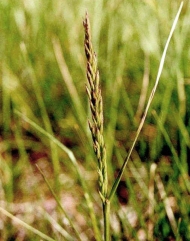
Tall fescue
| Name: | Tall Fescue (Festuca arundinacea) |
||||||||||||||||||||||||||||||||||||||||||
|---|---|---|---|---|---|---|---|---|---|---|---|---|---|---|---|---|---|---|---|---|---|---|---|---|---|---|---|---|---|---|---|---|---|---|---|---|---|---|---|---|---|---|---|
| Description: | Tussocky perennial grass. It is suited to a wide range of soils and tolerant of acid and moderately saline conditions, but also tolerates short periods of flooding. It is moderately persistent and drought tolerant depending on plant type, soil type and grazing management. In drier areas it is best suited to high altitudes. Sow in autumn or spring (irrigated and tablelands). | ||||||||||||||||||||||||||||||||||||||||||
| Sowing rate: | 6–15 kg/ha. | ||||||||||||||||||||||||||||||||||||||||||
| Minimum annual rainfall for temperate fescue: | 650 mm with a summer dominance and 450 mm (winter dominant) for Mediterranean types (see below) | ||||||||||||||||||||||||||||||||||||||||||
| Select varieties on the basis of: | Plant type: Two types are marketed – temperate and Mediterranean. Temperate types grow vigorously in spring, summer and autumn but less in winter. They are adapted to those areas with summer dominant rainfall, higher elevation areas or under irrigation. Mediterranean types have a more pronounced winter and spring production and are dormant over summer. This means they are more tolerant of summer moisture stress than temperate types. Seedling vigour: Fescue is slow to establish. Varieties with improved seedling vigour may enhance establishment. Rust resistance: Rust can be a problem in the autumn especially in high rainfall districts. Select varieties with high rust resistance where rust is known to be a problem. Performance: Seek local trial results (if available), for seasonal yields and persistence. Endophyte: Endophyte is a fungus living within the plant and capable of producing alkaloids toxic to livestock. Current tall fescue varieties available in NSW are free of wild-type endophyte. Older varieties (pre release of Demeter) e.g. Alta and Kentucky-31 may contain high levels of wild-type endophyte. In areas with a long history of tall fescue use (pre 1960) such as the Northern Tablelands of NSW there is the potential for animal health problems associated with endophyte, however, reports of such problems are not common. It is important to note that all turf varieties of tall fescue contain wild-type endophyte. Safe endophyte (also known as novel) varieties of tall fescue are available in NSW and are trade as MaxP. These endophytes do not produce alkaloids toxic to livestock but do produce ‘plant-friendly’ alkaloids that deter insects and have other reported benefits to the plant. Other factors that may be of importance are maturity, leaf digestibility or quality, rhizomatous spread potential. |
||||||||||||||||||||||||||||||||||||||||||
| Seed available: |
|
||||||||||||||||||||||||||||||||||||||||||


